
TWITTER CANCELED ME FOR NO REASON AND WHY YOU SHOULD CARE
 Sep 01, 2022
Sep 01, 2022
“Censorship is to art as lynching is to justice.”― Henry Louis Gates Jr, Professor, Harvard University
Social media connects the world, or so we’re told. People from every walk of life everywhere utilize social media platforms to form and maintain connections with others through expressions of facts, opinions, interests, and sentiments. Platforms today like Facebook, Instagram, TikTok, Reddit, and the one I have a beef with, Twitter, promote their platforms as a gateway to invite and engage everyone in public discourse, to find common ground or agreements to disagree, and to springboard together to a brighter future forged by greater understanding, all for free. According to Twitter, its mission is “to give everyone the power to create and share ideas and information instantly, without barriers.”
As users (read: customers) of these platforms, we are subliminally influenced by their algorithms, microtargeted marketing, and ads disguised as news that both drive and mask the core mercantile objectives of the platform providers. The trade-off for users of these platforms is that, in exchange for being perpetually the targets of unsolicited sales promotions, undisclosed market testing, and politically motivated news manipulation, they are free to widely express themselves in ways that would clearly be protected speech if the platforms were run by an American governmental entity rather than by corporate conglomerates. For many users, such as me, this Faustian bargain works, until it doesn’t.
My name is Jeffrey B. Simon. I am a trial lawyer and a founding partner of the law firm, Simon Greenstone Panatier, PC. I am a law professor, a legal commentator, a podcaster, and a person who for more than thirty years has strived to improve public health and public accountability through the civil justice system. I am also deeply passionate about protecting your right to trial by jury, as guaranteed by the 7th Amendment of the United States Constitution, as well as your 1st Amendment rights to freedom of speech. I have served in many leadership roles in organizations dedicated to the preservation of those essential freedoms and democratic values.
On Thursday July 29, 2022, Twitter “permanently suspended” my account (@JeffreyBSimon) without any evident cause or reason. I am unclear whether Twitter even knows why. Having provided me no prior notice of a violation or community guideline strike, Twitter abruptly revoked my account. Though I, and others on my behalf, have requested from Twitter information as to which tweet(s) violated which rules(s) and resulted in immediate revocation of my privileges, Twitter has been unwilling or unable to identify any.
Twitter has done this to many users. According to several news reports[1], Twitter locks over 1 million accounts per day and permanently suspends (revoking all privileges) over 500,000 accounts each day. Twitter commonly does so without producing any evidence that a violation occurred or that any “community guideline” was broken. In most cases, users receive a generic Twitter response, with little or no opportunity to rectify the matter. To add insult to injury, Twitter makes it virtually impossible to connect with a live agent or community manager. Users are simply relegated to an automated system that provides the appellant with no actual feedback nor a means to engage Twitter in substantive discussion of why the company suspended the account. Twitter deliberately creates an impenetrable shield between itself and the user, now loser, which is ironic for a company self-dedicated to creating a platform for dialogue devoid of “barriers.” Given that Twitter’s platform and underlying functionality were ostensibly developed to enhance real-time exchange of information, in my view the company’s robotic “gone fishing” form of response to suspension appeals is flagrantly perfunctory and smacks of deliberate indifference.
While some of those people may feel the same sense of frustration and confusion that I do, they may lack the resources or opportunities to publicize their mistreatment. I luckily do not. I am a trial lawyer and words are my tools. Mindful of the insight of the great poet, Dylan Thomas, whose words were better than mine, I refuse to “go gently into that good night.”
My inexplicable cancellation by Twitter was preceded by a short period of use. I joined Twitter in June 2021. I did not tweet nor follow others for several months after joining. Then, on April 15, 2022, I released the first season of my podcast, “Outside Counsel.“ When I released the podcast, I became more active on Twitter as a means to promote the podcast and to inform others about the roles that certain drug companies played in catalyzing, fueling, and profiting from America’s prescription opioid epidemic. Topics discussed on “Outside Counsel,” and in some of my tweets, include details about the misinformation and misleading tactics some pharmaceutical companies deployed to promote increased opioid prescribing, political influence they levied to further their objectives, the magnitude of the resulting public health crisis, legal dimensions of the crisis in the civil justice system and in certain regulatory agencies, and recommendations for the expansion of various harm-reduction strategies.
After a couple of months of tweeting almost exclusively about the opioid epidemic, I also began tweeting about topical legal issues. Those included matters raised by the Jan. 6 Committee hearings, U.S. Supreme Court rulings on reproductive choice and gun control, differing opinions (Professors Alan Dershowitz v. Lawrence Tribe) on standards for Presidential impeachment, and the Russian imprisonment of WNBA player Brittney Griner.
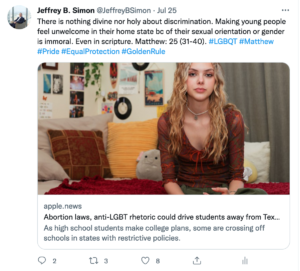

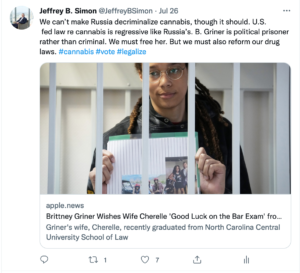

Some of my tweets were political in nature. I tweeted policy critiques of Senator Joe Manchin, Congressman Matt Gaetz, Attorney General Merrick Garland, and Congressman Ronny Jackson. Each of those tweets referenced publicly reported matters or were a response to public statements made by those officials. In other words, my politically oriented tweets were neither low brow nor insipid. Sometimes I tweeted love notes to my wife, kids, and dogs.
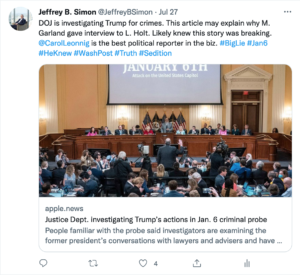

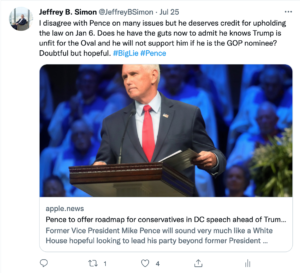



None of my approximately 471 tweets constituted hate speech. I have never tweeted anything that threatened, bullied, or defamed any person or any institution. With respect to Congressmen Gaetz and Jackson, I tweeted in reaction to what I and others perceived to be their public hate speech. I did so in ways that were pointed, occasionally cutting (particularly one I posted about Matt Gaetz on July 25, 2022), but neither profane nor threatening in any respect. While my tweet on July 25 contained a barb alluding to news reports that Mr. Gaetz is under law enforcement investigation for alleged sexual misconduct with a minor, those reports are a matter of public record. Many other Twitter users have posted similar remarks without penalty, including his pro-choice nemesis, Olivia Julianna, who used Twitter on July 24, 2022, to describe Matt Gaetz as “an alleged pedophile.”
I have never tweeted profanity. I have never advocated for violence, though I have used Twitter to denounce it, such as against the rioting of the Capitol on Jan. 6, 2021, and Russia’s invasion of Ukraine. I’ve used Twitter to decry bigotry in many forms, especially discrimination against people of color, women, and the LGBQT+ community.
Over the course of my five months as an active Twitter user, I accumulated roughly 3300 followers. I grew my modest following organically and appropriately. In doing so, I saw that some people generally agreed with my sentiments and reporting. While others disagreed, the discourse was always civil. I have never argued with anyone on Twitter, nor has anyone (to my knowledge) ever treated me rudely, other than Twitter itself when it unceremoniously revoked my privileges without prior notice or subsequent explanation. In sum, my Twitter usage was uncontroversial, by any measure, but certainly in comparison to others who Twitter has not canceled.
For example, Congressman Gaetz has a verified Twitter account with over 1.4 million followers. He is @RepMattGaetz and the hashtag that appeared on his home page below his Twitter handle read, “#BeOffended.” In other words, at least for a time, his stated goal was to use Twitter to offend people and to celebrate doing so. On May 4, 2022, Mr. Gaetz tweeted that some women who formally protested the overturning of Roe v. Wade did so because they are “over-educated, under-loved millennials who sadly return from protests to a lonely microwave dinner with their cats, and no bumble matches.” While I condemn Mr. Gaetz’s demeaning insults, Twitter did not, at least insofar as it did not revoke his Twitter account.
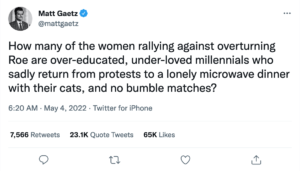

To be clear, while I find Mr. Gaetz’s tweet offensive, I’m not advocating that he be silenced on Twitter or anywhere else. I believe in Free Speech.
Even though Twitter is a corporation and not a state actor, and therefore censorship by Twitter does not raise 1st Amendment issues in a formal legal sense, I would still oppose Twitter censoring Mr. Gaetz for being offensive. While I have often disagreed with Justice Samuel Alito, I applauded his ruling and reasoning in Matal v. Tam where, writing for a majority that included Justices Roberts, Ginsburg, Breyer, Sotomayor, and Kagan, he observed, “Speech that demeans on the basis of race, ethnicity, gender, religion, age, disability, or any other similar ground is hateful; but the proudest boast of our free speech jurisprudence is that we protect the freedom to express ‘the thought that we hate. [2]
Still, unlike Mr. Gaetz, I have never tweeted anything misogynistic. Rather, I have repeatedly denounced misogyny on Twitter. Why is Twitter fine with Mr. Gaetz’s hate-filled sexism, but apparently not one or some of my tweets, none of which disparage women or peaceful demonstrators?
As was widely reported, Congresswoman Marjorie Taylor Greene (@RepMTG) used Twitter to attack a Biden administration official, Admiral Rachel Levine, for her transgender identity. She used “#WeenieChop” to mock Admiral Levine’s transition from male to female. While I and many others consider Ms. Greene’s transphobic attack to be revolting and unbecoming of a member of Congress, Twitter still welcomes Congresswoman Greene as a home to hurl that brand of hate-speech.
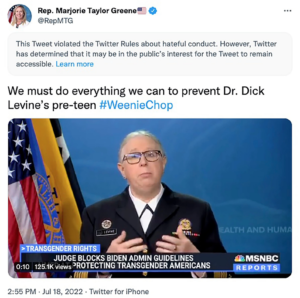

Perhaps the difference is that Mr. Gaetz and Ms. Greene, as members of Congress, have special status at Twitter that I don’t. After all, not only does Twitter permit their continued use of the platform, but these two firebrands are rewarded with the iconic Twitter verified blue checkmark. I am referring to the “public interest” rationalization that Twitter reportedly deploys when it determines that a public figure can post comments on the platform that it would not tolerate from a private citizen. Setting aside a debate over that policy, I’ve never posted anything as demeaning or transphobic as “#WeenieChop,” by which to compare the import of Congresswoman Greene’s public profile to my private one. Twitter revoked Ms. Greene’s personal account some time ago, but not the one she used as a member of Congress to specifically attack Admiral Levine and transgender people more generally. Maybe the difference is that they each have an enormous number of Twitter followers, and at the time Twitter canceled me, I didn’t. Perhaps Twitter favors their far-right political views over my considerably more moderate ones. I really can’t know since Twitter won’t tell me why it revoked my use privileges. But I know this:
Twitter practices a double-standard, where, on a platform that is supposed to exist as a global public square for open discourse, hate-speech by public figures is tolerated while civil dialogue by private citizens is permanently censored for non-disclosed, seemingly unidentifiable reasons.
Over the course of time, Twitter, as a company, has grown neither wiser nor more equitable. The larger it grows, the more insular and arbitrary it behaves. It picks users and losers for reasons only it understands, or perhaps fully doesn’t, but refuses to disclose either way. As reported by Cracked.com, Twitter suspended a user for tweeting they’d like to have sex with Tony the Tiger, the cartoon icon Kellogg features to promote its breakfast cereal, Frosted Flakes. While the tweet was crass and juvenile, the expression of sexual desire for a cartoon character is not threatening, bullying, or pornographic. The subject was a cartoon character. Who was so offended that Twitter, in good conscience, had to shut the account down? Were they fans of certain breakfast cereals or the community of cartoon characters who promote breakfast cereals? If the tweet also expressed sexual desire for Fruit Loops’ Toucan Sam and the Lucky Charms leprechaun, would Twitter have still revoked the user’s privileges, or conversely, might the company have rewarded the user with a blue check mark for being more inclusive?
Obviously, our society is not edified by sexual banter about cartoon characters, but neither is it demonstrably harmed. Whereas the Tony the Tiger tweet was silly, Twitter’s decision to suspend the user over it is more threatening because it is consistent with and illustrative of the company’s systemic practice of senseless censorship of unfamous people and coddling of infamous ones. My tweets were neither silly nor sophomoric. Many of them were quite serious and constituted evidence-based legal opinion or political expression. Twitter’s revocation of me and so many others is self-evidently antithetical to the company’s self-proclaimed, existential ideal of giving “everyone the power to create and share ideas and information instantly, without barriers.” Twitter knows better, but apparently doesn’t care to do better.
Twitter can cancel me, and it can cancel you. It can do so for any reason or no reason at all. However, Twitter will not silence me. Nor should it silence you.
Op-Ed Written By: Jeffrey B. Simon
Citations:
- Dan Milmo. “Twitter says it suspends 1m spam users a day as Elon Musk row deepens”, The Guardian, July 2022. https://www.theguardian.com/technology/2022/jul/07/twitter-says-it-suspends-1m-spam-users-a-day-as-elon-musk-dispute-deepens
Jurgita Lapienytė. “Twitter CEO: we suspend over half a million spam accounts every day”, Cybernews, May 2022, https://cybernews.com/news/twitter-ceo-we-suspend-over-half-a-million-spam-accounts-every-day/ - Supreme Court Of The United States. “Matal, Interim Director, United States Patent and Trademark Office v. Tam”. Opinion of ALITO, J Trial Court Case No. 15-1293, p25. 26 October 2017
suggestions


Corralling the Pills: Rural East Texas Counties Take on Big Pharma Over the Opioid Crisis












Jeffrey B. Simon gratified by ‘opportunity to help people who deserve help and really need…












The 2020 Lawdragon 500 Leading Plaintiff Consumer Lawyers list Jeffrey B. Simon












Jeffrey B. Simon Honored Among Texas Legal Trailblazers for Work in Ongoing Opioid Litigation












Jeffrey B. Simon Top National Trial Lawyer Within U.S












Jeffrey B. Simon is listed Best Lawyer – 4 years in a row












West Virginia trial puts spotlight on sprawling opioid cases












Perrin Conferences Announces “The Opioid Litigation Conference” June 28 in Dallas, TX












